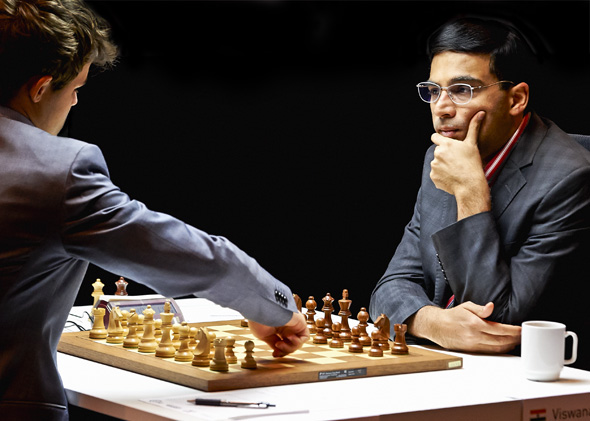Norway’s Magnus Carlsen (at left), reigning World Chess Champion, and India’s Viswanathan Anand
THE TRUTH ABOUT EXPERT PERFORMANCE
What does it take to become a world-class expert in any given field? Is it some innate talent that passeth training? Or is it deliberate practice by way of time on task that does the trick? Is it just any repetitive practice that takes one to the expert status or a certain kind of practice that promises success? If that were so, kids playing video games would emerge world-class experts for by the time they reach the end of their teen years, they have accumulated several thousand hours in the sport.
Can 10,000 hours of practice really turn anyone into an expert at anything? The widely publicized theory highlighted in a 1993 psychology paper by Ericsson et al.[1] and popularized by Malcolm Gladwell’s book Outliers[2] and Geoff Colvin’s book, Talent Is Overrated,[3] says that anyone can master a skill with 10,000 hours of deliberate practice.
Anders Ericsson et al.’s 1993 paper titled The Role of Deliberate Practice in the Acquisition of Expert Performance explains expert performance as the end result of individuals’ prolonged efforts to improve performance while negotiating motivational and external constraints. In most domains of expertise, individuals begin in their childhood a regimen of effortful activities (deliberate practice) designed to optimize improvement. These authors conclude that many characteristics once believed to reflect innate talent are actually the result of intense practice extended for a minimum of 10 years.[4]
Recently, the theory has been challenged that the magical number of 10,000 hours or 10 years of practice makes you an expert.[5] Though very important, practice alone won’t make you Yo Yo Ma: “No one disputes that practice is important,” says psychologist David Zachary Hambrick of Michigan State University in East Lansing. “Through practice, people get better. The question is whether that is all there is to it.”[6]
On the other side of the spectrum, we have the contrarian exploration of great athletic feats David Epstein’s The Sports Gene: Inside the Science of Extraordinary Athletic Performance[7] which looks at the genetic associations to winning in sports. Ericsson agrees with Tucker’s and Collins’ claim about the current failure ‘to discover a candidate gene that can be conclusively linked to performance.’ However, it will be incorrect to misconstrue this failure ‘as evidence that genetics play only a minimal, or even no role, in the attainment of elite performance,’ says Ericsson.[8]
In an editorial to the British Journal of Sports Medicine, Dr. K. Anders Ericsson comments about the popularised but simplistic view of their work circulated on the internet, which suggests that anyone who has accumulated sufficient number of hours of practice in a given domain will automatically become an expert and a champion. The truth is far from it.
A study published in May 2013 in the journal Intelligence by Hambrick and colleagues suggested that practice explains only about a third of success among musician and chess masters. To be precise, they concluded that practice accounted for only 30 percent of success in music and 34 percent in chess. They also found wide variability in the hours of practice. Chess grand masters had put in from 832 to 24,284 hours of work, although the average was around 10,530 hours. Musicians’ efforts ranged from 10,000 to 30,000 hours.[9]
Ericsson notes that Gladwell’s book Outliers mistakes the average of 10,000 hours that experts took to master a skill described in his research with the total they required.
Practice is important but it is perhaps not the only thing. Quite a number of studies suggest that aside from practice hours, individual differences—ranging from socioeconomics to coaching to I.Q—help explain expert success.
However, there is a downside to viewing talent as inborn. If talent is viewed as innate and not the result of practice, Ericsson rightly fears, disadvantaged kids will be cut off from opportunities in education and sports.
Excellence is a complex, multi-faceted issue and the jury is still out on the roles of natural endowment and hard work in human performance. Perhaps it is both practice and genes that make champions. How much of each, no one really knows. Genes perhaps make practice enjoyable and practice likewise makes it easier to actualize genes’ promise. One thing is clear though: when it comes to human beings, the only definite thing one can say is that nothing definite can be said about them. The perennial debate over nature vs. nurture continues.
Perhaps the best thing is to be born as a genius. The next best thing is to work at it!
[1] K. Anders Ericsson, R. Th. Krampe and C. TeschRomer, The role of deliberate practice in the acquisition of expert performance. Psychological Review, 1993, 100(3), 363-406.
[2] Malcolm Gladwell, Outliers: The story of success (New York: Little, Brown and Company, 2008)
[3] Geoff Colvin, Talent Is Overrated (New York: Portfolio, 2010)
[4] K. Anders Ericsson, Ralf Th. Krampe, and Clemens Tesch-Romer, The role of deliberate practice in the acquisition of expert performance.
[5] Shaunacy Ferro, Scientists Debunk The Myth That 10,000 Hours Of Practice Makes You An Expert, Fast Company, March 12, 2014. Retrieved November 8, 2015: http://www.fastcodesign.com/3027564/asides/scientists-debunk-the-myth-that-10000-hours-of-practice-makes-you-an-expert
[6] Cited in Dan Vergano, Are Malcolm Gladwell’s 10,000 Hours of Practice Really All You Need? National Geographic, March 12, 2014. Emphasis added. Retrieved November 8, 2015: http://news.nationalgeographic.com/news/2014/03/140310-gladwell-expertise-practice-debate-intelligence/
[7] David Epstein, The Sports Gene: Inside the Science of Extraordinary Athletic Performance (New York: Current, 2014)
[8] K. Anders Ericsson, Training history, deliberate practise and elite sports performance: an analysis in response to Tucker and Collins review—what makes champions? British Journal of Sports Medicine, 2012. Retrieved November 8, 2015: http://bjsm.bmj.com/content/early/2012/10/29/bjsports-2012-091767.extract
[9] Cited in Dan Vergano, Are Malcolm Gladwell’s 10,000 Hours of Practice Really All You Need?


Recent Comments